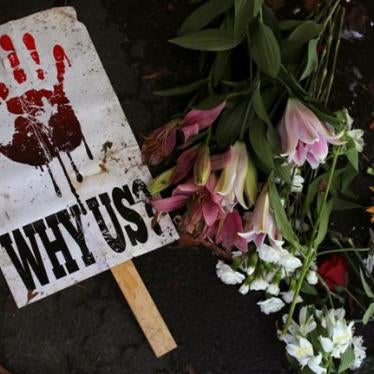May 14, 2018
U.S. House of Representatives
Washington, DC 20515
U.S. Senate
Washington, DC 20515
RE: Coalition Opposition to H.R. 5698/S. 2794, the Protect and Serve Act of 2018
Dear Members of Congress:
On behalf of the more than 20 undersigned civil rights, civil liberties, faith-based, and government accountability organizations, we write to urge you to oppose H.R. 5698/S. 2794, the Protect and Serve Act of 2018, which creates a new crime for offenses that target law enforcement officers.
First, police already have substantial protections under federal and state law, rendering this bill superfluous. Second, this bill signals that there is a “war on police,” which is not only untrue, but an unhelpful and dangerous narrative to uplift. And finally, bills similar to Protect and Serve that have been introduced in states around the country—so called “Blue Lives Matter” bills—appear to be a political response to the growing national movement for police accountability in the face of continued killings and assaults of unarmed African Americans; therefore, this bill is divisive and will have a negative impact on the relationship between law enforcement and the communities they serve.
- Federal and state criminal laws already offer ample protection to police officers.
Federal law already has extremely strong penalties for people who commit crimes against law enforcement officers and other public officials. For example, federal laws impose a life sentence or death penalty on persons convicted of first-degree murder of federal employees or officers,[1] killing state and local law enforcement officers or other employees assisting with federal investigations,[2] and killing officers of the U.S. courts.[3] All fifty states have laws that enhance penalties for people who commit offenses against law enforcement officers, including for homicide and assault.[4]
Moreover, there is no record that crimes against law enforcement go unprosecuted or are otherwise treated frivolously. There is no record to suggest that prosecutors are unwilling or unable to charge individuals with crimes against law enforcement. In fact, crimes against police officers are treated as among the most heinous criminal acts, given the high degree of culpability and punishment attached to such crimes.
- The Protect and Serve Act does not advance any stated policy goals, because law enforcement is not subject to increasing or widespread attacks.
There is no doubt that police work is a dangerous undertaking, but the reality is that there has been a continuing decline in the number of officers killed or assaulted in the line of duty over the last several decades.[5] In the past ten years, the number of officers feloniously killed has fluctuated, yet not significantly increased or decreased,[6] as have ambush-style killings of officers.[7] Given these facts, this bill perpetuates a false narrative that police are under increasing attack by their communities. Such a message is unhelpful and unsupported.
Furthermore, the Protect and Serve Act does nothing to meaningfully improve officer safety and wellness if that is an intended policy goal. For example, it does not call for support services, better training, improved safety measures, increased supervision, or any of the other multiple measures available to law enforcement that are widely accepted as promoting officer safety and wellbeing.[8]
- The Protect and Serve Act is polarizing and harms community-police relations.
This bill is being contemplated at a time when our country is in the throes of a national policing crisis, with a never-ending stream of police shootings of unarmed African Americans captured on video. Creating a new, yet superfluous, crime for offenses committed against law enforcement is a particularly disconnected and non-responsive policy choice. Unfortunately, the Protect and Serve Act is similar to other “Blue Lives Matter” type bills that create new criminal offenses and penalty enhancements for crimes against police.
Collectively, these policy efforts, which have sprung up amid the national call for police accountability, appear to be a political response to the powerful activism of grassroots movements that demand fair and constitutional policing. Rather than focusing on policies that address issues of police excessive force, biased policing, and other police practices that have failed these communities, the Protect and Serve Act’s aim is to further criminalize. This bill will be received as yet another attack on these communities and threatens to exacerbate what is already a discriminatory system of mass incarceration in this country. Continuing to undermine police-community relations in this manner sows seeds of division, which ultimately threatens public safety and undermines the work of law enforcement.
For the reasons summarized above, we urge you to vote against the Protect and Serve Act as it comes before the U.S. House of Representatives. There is no justification for creating a new crime for offenses committed against law enforcement. At a time when we need to foster healing between law enforcement and our communities, we should not be considering legislation which not only does nothing to advance the goal of officer safety, but will further erode the relationship between police and communities.
Thank you for your consideration of this matter. If you have any questions, please contact Kanya Bennett of the ACLU at 202-715-0808 or kbennett@aclu.org; Sakira Cook of The Leadership Conference at (202) 263- 2894 or cook@civilrights.org; or Sonia Gill Hernandez of the NAACP Legal Defense and Educational Fund, Inc.at 202-216-5569 or sgill@naacpldf.org.
Sincerely,
American Civil Liberties Union
Anti-Defamation League
Church of Scientology National Affairs Office
CLASP
The Daniel Initiative
Defending Rights & Dissent
Friends Committee on National Legislation
Human Rights Watch
Government Information Watch
The Leadership Conference on Civil and Human Rights
NAACP
NAACP Legal Defense and Educational Fund, Inc.
National Action Network
National Association of Criminal Defense Lawyers
National Association of Social Workers
National Center for Transgender Equality
The National Council for Incarcerated and Formerly Incarcerated Women and Girls
National Council of Churches
People for the American Way
PolicyLink
Southern Poverty Law Center
StoptheDrugWar.org
[1] 18 U.S.C. §1114 (1996).
[2] 18 U.S.C. §1121(a)(1)(1996).
[3] 18 U.S.C. §1503 (1996).
[4] See, e.g., Monu Bedi, The Asymmetry of Crimes By and Against Police Officers, 66 Duke L.J. 79 (2017).
[5] See Radley Balko, Once again: There is no ‘war on cops.’ And those who claim otherwise are playing a dangerous game, Washington Post (Sept. 10, 2015), https://www.washingtonpost.com/news/the-watch/wp/2015/09/10/once-again-there-is-no-war-on-cops-and-those-who-claim-otherwise-are-playing-a-dangerous-game/?utm_term=.144e3c91fa5b; Martin Kaste, Is There A 'War On Police'? The Statistics Say No, National Public Radio (Sept. 17, 2015), http://www.npr.org/2015/09/17/441196546/is-there-a-war-on-police-the-statistics-say-no. Between 2007 and 2016, the number of officers killed in ambush situations were 16, 6, 15, 15, 15, 6, 5, 7, 4, and 17, for each year, respectively. U.S. Dept. of Justice, Law Enforcement Officers Killed & Assaulted, 2007-2016, https://ucr.fbi.gov/ucr-publications.
[6] Between 2007 and 2016, the FBI reported the number of officers feloniously killed in the U.S. were 58, 41, 48, 56, 72, 49, 27, 51, 41, and 66 for each year, respectively. U.S. Dept. of Justice, 2016 Law Enforcement Officers Killed & Assaulted, https://ucr.fbi.gov/leoka/2016/officers-feloniously-killed/tables/table-2.xls. In 2017, the 44 officers were killed in a fire-arm related incident. Law Enforcement Officers Memorial Fund, Preliminary 2017 Law Enforcement Officer Fatalities Report, http://www.nleomf.org/assets/pdfs/reports/fatality-reports/2017/2017-End-of-Year-Officer-Fatalities-Report_FINAL.pdf.
[7] Between 2007 and 2016, the number of officers killed in ambush situations were 16, 6, 15, 15, 15, 6, 5, 7, 4, and 17, for each year, respectively. U.S. Dept. of Justice, 2016 Law Enforcement Officers Killed & Assaulted, https://ucr.fbi.gov/leoka/2016/officers-feloniously-killed/tables/table-2.xls. In 2017, 8 officers were killed in an ambush-style attack. Law Enforcement Officers Memorial Fund, Preliminary 2017 Law Enforcement Officer Fatalities Report, http://www.nleomf.org/assets/pdfs/reports/fatality-reports/2017/2017-End-of-Year-Officer-Fatalities-Report_FINAL.pdf.
[8] See, e.g. President’s Taskforce on 21st Century Policing, Final Report of the President’s Taskforce on 21st Century Policing 61-68 (May 2015), https://cops.usdoj.gov/pdf/taskforce/TaskForce_FinalReport.pdf.








